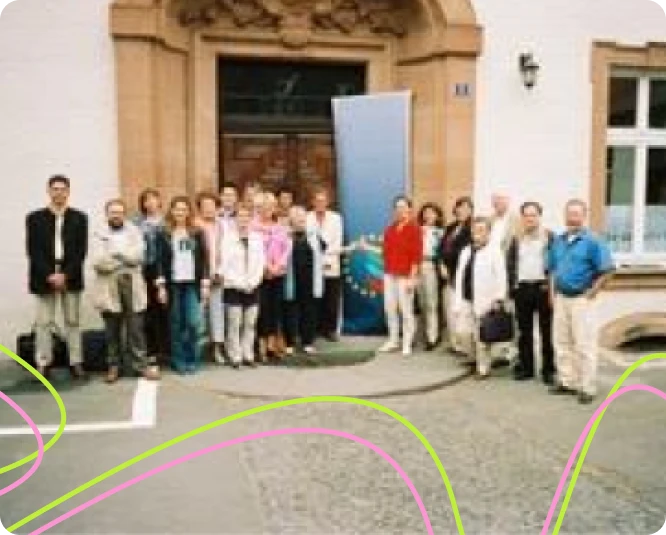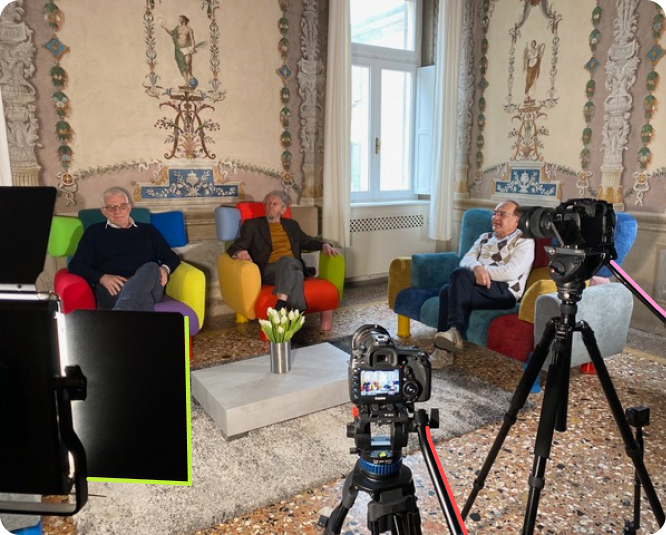Italy
Italy is a culturally rich and diverse country in Southern Europe, known for its regional variations in language, traditions, and historical influence.
This diversity is also visible in the field of psychomotricity, with different developments and practices emerging across the country’s regions, such as in the North, Center, and South.
Professional Framework in Italy
Italy has two distinct psychomotricity professions, reflecting Italy’s commitment to broad-based psychomotor care across the lifespan and specialized pediatric therapy:
Psicomotricista and Terapista della Neuro e Psicomotricità dell’Età Evolutiva (TNPEE).
A psicomotricista works with individuals of all ages, focusing on psychomotor development in prevention, educational and health settings.
The professional title is
Piscomotricista
The profession is
recognized
The profession is recognized as such by state health and educational authorities, as well as private institutions and insurance companies.
protected
The title of psicomotricista is protected and reserved for holders of recognized diplomas.
self-regulated
The profession is regulated by national associations.
The law of January 2013 (L.4/2013) now provides professional recognition for the profession, classifying psychomotricity as a “non-regulated” profession.
This means that a psychomotrician is recognized for their professional practice but not for their education.
A TNPEE specializes in treating children with neurodevelopmental disorders within the sanitary system.
The professional title is
Terapista della Neuro e Psicomotricità dell’Età Evolutiva (TNPEE)
The profession is
recognized
The profession is recognized as such by state health and educational authorities, as well as private institutions and insurance companies.
protected
The title of TNPEE is protected and reserved for holders of recognized diplomas.
state-regulated
State-regulated means that the education in that country is organized and supervised by the state.
Educationin Italy
Psicomotricista
The pathway to becoming a Psicomotricista in Italy is offered through specialized part-time three-year programs at private institutions.
These programs focus on medical, pedagogical, psychological and psychomotor contents, comprising 2400-2750 hours of comprehensive theoretical and practical training. This route enables professionals to work with individuals of all ages in prevention, educational, and healthcare settings.
PRIVATE INSTITUTES
Certificato di competenza professionale di Psicomotricista
180 ECTS
2750 hours
Italian
Verone – Centro Italiano Studi e Ricerche in Psicologia e Psicomotricità (CISERPP)
Certificato di competenza professionale di Psicomotricista
180 ECTS
2550 hours
Italian
Rome – Associazione Italiana Servizi Formativi Innovativi (AISFI)
Certificato di competenza professionale di Psicomotricista
180 ECTS
2400 hours
Italian
Varese – Istituto Psicologico Europeo (IPSE)
Terapista della Neuro e Psicomotricità dell’Età Evolutiva
A full-time three-year university degree is required to become a Terapista della Neuro e Psicomotricità dell’Età Evolutiva (TNPEE).
This structured program offers a regulated education focused on neurodevelopmental care, including in-depth clinical training and direct integration into the national healthcare system.
UNIVERSITY
Bachelor in Terapia della neuro e psicomotricità dell'età evolutiva
180 ECTS
Italian
Ancona – Università degli Studi Politecnica delle Marche
L’Aquila – Università degli Studi dell’Aquila
Caserta – Università degli Studi della Campania “Luigi Vanvitelli”
Genova – Università degli Studi di Genova
Messina – Università degli Studi di Messina
Milan – Università degli Studi di Milano
Milan – Università degli Studi di Milano – Bicocca
Padova – Università degli Studi di Padova
Pavia – Università degli Studi di Pavia
Pisa – Università degli Studi di Pisa
Rome – Università degli Studi di Roma “Cattolica del Sacro Cuore”
Rome – Università degli Studi di Roma “La Sapienza”
Rome– Università degli Studi di Roma “Tor Vergata”
Turin – Università degli Studi di Torino
Psicomotricista
In Italy, the University of Verone and the Italian Studies and Research Center for Psychology and Psychomotricity (CISERPP) collaborate closely with a French institute to offer a postgraduate degree in Psychomotricity for “psicomotricisti”.
Máster Internacional en Psicomotricidad (MIP) - Titre d'Expert à Référentiel Européen (TE)
120 ECTS
Italian & French
Verone – ISRP-Paris, CISERPP, Univeristy of Verona
Working
in Italy
Get your diploma recognition
In Italy, the recognition of foreign diplomas in psychomotricity follows the general rules set by the European Union and national regulations.
The process involves the submission of relevant documents to the Italian Ministry of Health, where your qualifications will be assessed for equivalency, or to the Italian Psychomotricians Professional Association (APPI) to be enabled as a psychomotrician.
This process ensures that your educational background and professional qualifications meet the Italian standards for practicing psychomotricity.
Get to know the professional associations
Associazione Professionale Psicomotricisti Italiani (APPI) oversees professional standards and advocate for the interests of psychomotricians at both national and European levels. Joining these associations is highly recommended as they provide support, professional development opportunities, legal protection, and a network of peers.
Coordinamento Nazionale di Psicomotricità (CoNAPP) oversees professional standards and advocate for the interests of psychomotricians at both national and European levels. Joining these associations is highly recommended as they provide support, professional development opportunities, legal protection, and a network of peers.
Psychomotricity
in Italy
Intro
Turning points

1974
First Education Programs
The establishment of the first formal educational programs in psychomotricity, deeply influenced by French models, which introduced structured training pathways for the profession.

1994
Autonomous Identity of Psychomotricity
The recognition of psychomotricity as a specialization within physiotherapy (decree signed by Health Minister Garavaglia) marked a crucial but controversial moment.
The decree highlighted the need to clarify the specific role of the psychomotrician concerning other healthcare professions. The professional community responded strongly, with efforts to block the decree and reaffirm the autonomous identity of psychomotricity as a distinct discipline.

1996
European Forum of Psychomotricity
The European Forum of Psychomotricity (EFP) is created,
with Switzerland as a founding member, represented by Franco Boscaini.

1997
TNPEE, a Specific Intervention
The enactment of the Legal Decree 56/1997 by the Italian Ministry of Health formally recognized the profession of childhood neuro and psychomotor therapist (TNPEE), differentiating it from the wider Psychomotricity intervention.
Since then, the national associations have worked tirelessly towards achieving full professional recognition and broader acknowledgment of the field’s importance.

2013
More and More Recognition
The Italian Ministry of Economic Development’s Law (L. 04/2013) further solidified the legal framework, ensuring that the profession of psicomotricista is protected across various education and healthcare settings.
FAQ
Here are few answers to frequently asked questions
in order to understand better Psychomotricity in Italy.
Do I need some special authorisation to practise in Italy?
Yes, to work as a "Terapista della Neuro e Psicomotricità dell’Età Evolutiva (TNPEE)" in Italy, an official recognition of the TNPEE qualifications by the Italian Ministry of Health is mandatory. This process may include additional assessments or requirements depending on your educational background to ensure that you meet the national standards for practicing within the healthcare system.
To work as a "Psicomotricista", it is necessary to contact the relevant national association, such as APPI (Associazione Professionale Psicomotricisti Italiani).
The association will evaluate the applicant's educational background to verify that it aligns with the professional standards in Italy.
This step is important not only for ensuring that the applicant's qualifications are recognized, but also for securing professional protection and support as a practicing psicomotrician in the country.
In which fields can I work as a psychomotor therapist in Italy?
In Italy, psychomotricians can work across several fields, including healthcare, education, and rehabilitation.
Common settings include:
- Healthcare facilities: where psychomotricians work with people with neurodevelopmental disorders, neurological conditions, or mental health issues.
- Educational settings: Schools and early childhood education centers, where psychomotricians support the development of motor skills, cognitive abilities, and emotional regulation in children.
- Private practice: Offering psychomotor sessions for individuals across the lifespan, addressing issues ranging from developmental delays to stress management and mental health concerns.
Is psychomotor therapy financially covered in Italy?
Yes, in sanitary contexts, psychomotor therapy is covered by the national healthcare system, particularly when it is prescribed as part of a rehabilitation program for children (TNPEE).
However, for psychomotricity sessions in the fields of prevention and education for children, adults and elderly individuals (Psicomotricista), coverage may vary.
These sessions are not considered medical interventions, but they can be reimbursed depending on the client's fiscal situation.
Is psychomotor therapy subject to a medical prescription in Italy?
In Italy, psychomotor therapy provided by a TNPEE is subject to a medical prescription, especially when offered as part of a therapeutic or rehabilitation plan for children with neurodevelopmental disorders or other medical conditions.
Psychomotor intervention provided by a "psicomotricista" in private settings or educational contexts does not require a medical prescription. Their work focuses more on educational, preventive, and developmental aspects rather than medical treatments.